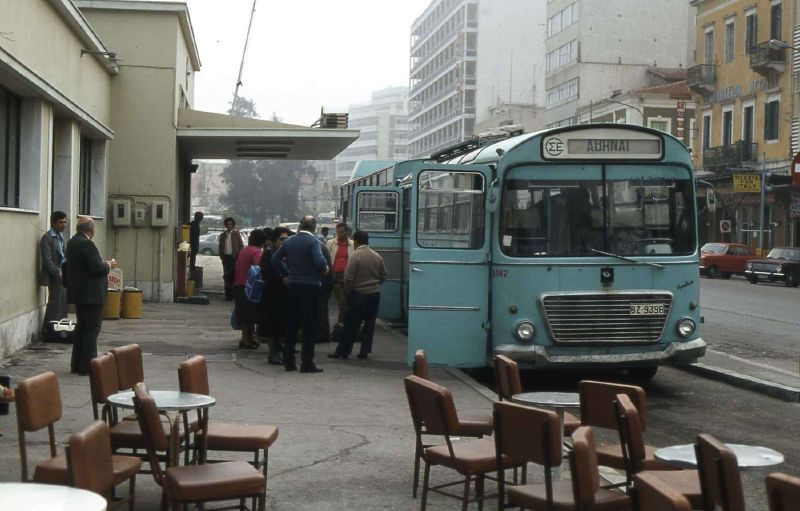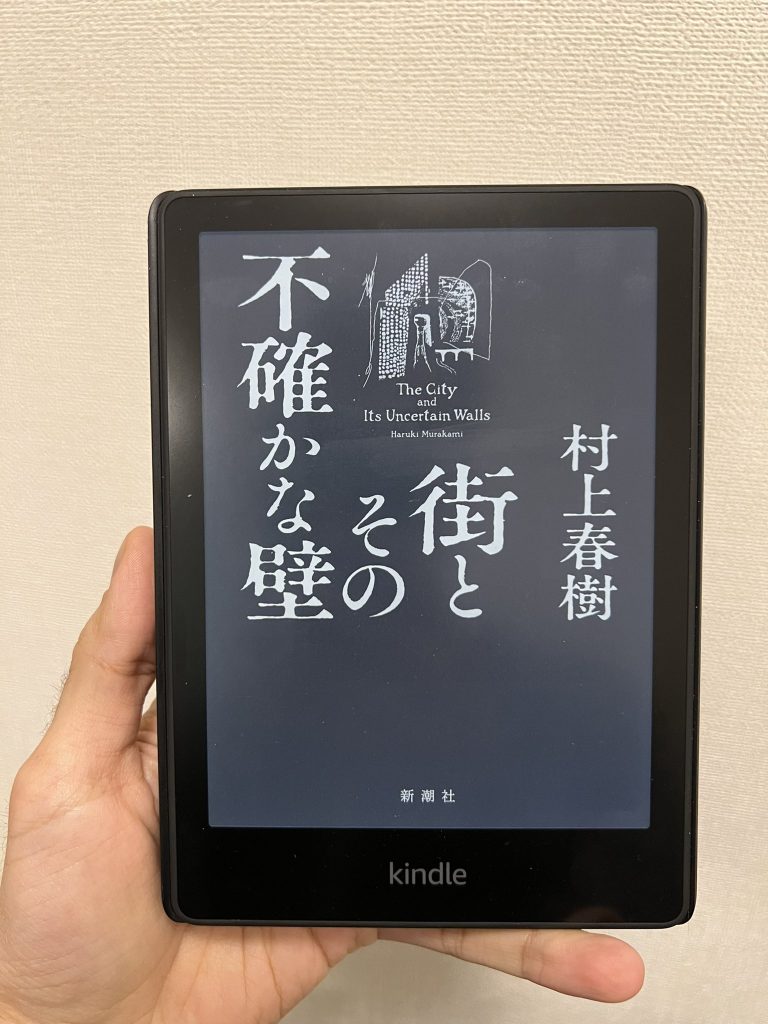Welcome to Year 16 of Murakami Fest! This year, as hinted in last month’s newsletter and podcast, I’ll be continuing my look at 遠い太鼓 (Distant Drums), Murakami’s travel memoir from his years living in Europe.

Patras Station, 1981. A bus is brought in to replace the broken down Patras-Athens train. Via Wikimedia.
Year 1: Boobs, The Wind, Baseball, Lederhosen, Eels, Monkeys, and Doves
Year 2: Hotel Lobby Oysters, Condoms, Spinning Around and Around, 街・町, The Town and Its Uncertain Wall, A Short Piece on the Elephant that Crushes Heineken Cans
Year 3: “The Town and Its Uncertain Wall” – Words and Weirs, The Library, Old Dreams, Saying Goodbye, Lastly
Year 4: More Drawers, Phone Calls, Metaphors, Eight-year-olds, dude, Ushikawa, Last Line
Year 5: Jurassic Sapporo, Gerry Mulligan, All Growns Up, Dance, Mountain Climbing
Year 6: Sex With Fat Women, Coffee With the Colonel, The Librarian, Old Man, Watermelons
Year 7: Warmth, Rebirth, Wasteland, Hard-ons, Seventeen, Embrace
Year 8: Pigeon, Edits, Magazines, Awkwardness, Back Issues
Year 9: Water, Snæfellsnes, Cannonball, Distant Drumming
Year 10: Vermonters, Wandering and Belonging, Peter Cat, Sushi Counter, Murakami Fucks First
Year 11: Embers, Escape, Window Seats, The End of the World
Year 12: Distant Drums, Exhaustion, Kiss, Lack of Pretense, Rotemburo
Year 13: Murakami Preparedness, Pacing Norwegian Wood, Character Studies and Murakami’s Financial Situation, Mental Retreat, Writing is Hard
Year 14: Prostitutes and Novelists, Villa Tre Colli and Norwegian Wood, Surge of Death, On the Road to Meta, Unbelievable
Year 15: Baseball on TV, Kindness, Murakami in the Asahi Shimbun – 日記から – 1982, The Mythology of 1981, Winning and Losing
The next chapter is “Easter Weekend in Patras and the Closet Massacre – April 1987” (パトラスにおける復活祭の週末とクローゼットの虐殺 1987年4月).
The Murakamis are returning to Greece from Italy, relieved to be going back to a familiar place. Murakami begins by noticing the different variety of backpackers, their appearances, and their travel styles. The northern Europeans in particular are looking to suffer while traveling during their youth—staying in the cheapest hotels, avoiding restaurants, barely spending money. There are few Italians who backpack. He notices a few on the ferry, and they’re loud and rowdy, and he eventually watches them board a group bus.
They spend the night at the port town of Patras rather than kill themselves trying to make it all the way to Athens in one day. The rest of the chapter is a really nice little story of staying the night there and then finally making it to Athens.
Murakami begins this section ominously: パトラスでは幾つかの出来事があった (There were a number of incidents in Patras) (245).
The first is the titular “closet massacre.” Murakami got into the habit of locking his camera in the closet while in Italy, and when they return to the room, the key snaps off in the lock. A woman from the hotel comes and first tries pulling, kicking, and slamming into it to no avail (and to the unease of Murakamis). She says she’ll go get a “tool” and returns with a grapefruit-sized rock that she pounds on the closet handle.
“I think things are worse than when we started,” my wife said.
“I was thinking the same thing,” I said.
“Maybe they should call a locksmith?”
“There’s no way they could get someone like that on Easter weekend,” I said. There was zero chance they’d be able to ring up a locksmith and have them bolt over here on Easter weekend. It’d even be unlikely on a weekday with nothing going on.
As we were saying all this, the woman came back with a new rock. This time she had a solid block of marble. It looked powerful. She showed it to us with a proud smile. We couldn’t help but smile back. What else were we supposed to do?
Then the woman energetically began the closet massacre. She slammed the marble like the graphic text on the “Batman” TV show: CRASH! BOOM! BLITZ! Pieces of wood flew in the air. A giant hole opened in the door, and we finally got our camera back. It was very simple. But I wondered what the people who stayed in this room after us would think happened here when they looked at the closet door and saw this massive hole. That said, I thought further, come to think of it, I had seen holes like that in other hotel rooms before.
「事態は前より悪くなってるんじゃないかしら?」と女房は言う。
「そんな気もするけど」と僕は言う。
「専門家を呼んでもらった方がいいんじゃない?」
「復活祭の週末にそんなもの来ない」と僕は言う。復活祭の週末に、鍵の専門家が電話一本で飛んで来てくれるわけがないじゃないか。何もない平日だって相当疑わしいというのに。
とかなんとか言っているうちにおばさんが新たな石を手に戻ってくる。今度のはがっちりとした大理石のブロックである。見るからに強力そうだ。おばさんはそれをぼくらに見せて得意げににっこりする。僕らも仕方なくにっこりする。他にどうすればいい?
それからおばさんは元気いっぱいクローゼットの虐殺にとりかかる。テレビの『バットマン』の吹き出しみたいにCRASH! BOOM! BLITZ! と石を叩きつける。木片が飛び散る。戸に大きな穴が開き、我々はやっとカメラを取り戻す。とてもシンプルである。でも僕は思う、これから先この部屋に泊まる人々はこのクローゼットの戸に開いた大きな穴を見ていったい何を考えるのだろうか、と。でも、と僕は更に思う。そういえばこういうタイプの穴を、どこか別のホテルで前にも見たことあるな、と。 (246-247)
The woman later knocks on the door in the middle of the night, this time to give them Greek Easter bread (which must be tsoureki).
Murakami ends the chapter really nicely. They end up eating the bread during a break in their bus ride the next day. The weather is perfect; spring has arrived in Greece, and everyone is grilling sheep to celebrate. He relays a conversation with a young English woman on holiday, and when the bus eventually breaks down, she and the Murakamis hail a cab while the drivers are just staring at the dead bus:
A wide variety of things died on Easter weekend, 1987.
Tens of thousands of sheep, a closet at the Adonis Hotel, and the engine of a bus to Athens. None of it was my fault.
一九八七年の復活祭の週末には、けっこういろんな物が死んだ。
数万頭の羊たちと、アドニス・ホテルのクローゼットと、アテネ行きのバスのエンジン。僕のせいじゃない。 (249)
Check back next week to see where the Murakamis are off to next.

